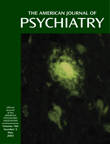Toward a Neuropsychological Theory of Antidepressant Drug Action: Increase in Positive Emotional Bias After Potentiation of Norepinephrine Activity
Abstract
OBJECTIVE: Antidepressants that increase serotonin or norepinephrine in the brain are effective in treating depression, but there is no neuropsychological account of how these changes relieve depressive states. Cognitive theories suggest that biases in information processing lead depressed patients to make unrealistically negative judgments about themselves and the world. METHOD: A single dose of the noradrenergic antidepressant reboxetine or placebo was administered to 24 healthy volunteers. Effects on emotional processing were assessed through facial expression recognition, emotional categorization, and emotional memory. RESULTS: On the three measures, reboxetine biased perception toward positive, rather than negative, information in the absence of changes in nonemotional performance or mood. CONCLUSIONS: These results suggest that a single dose of an antidepressant can increase the processing of positively valenced material in nondepressed volunteers. Antidepressants may therefore work in a manner similar to that of psychological treatments that aim to redress negative biases in information processing.



